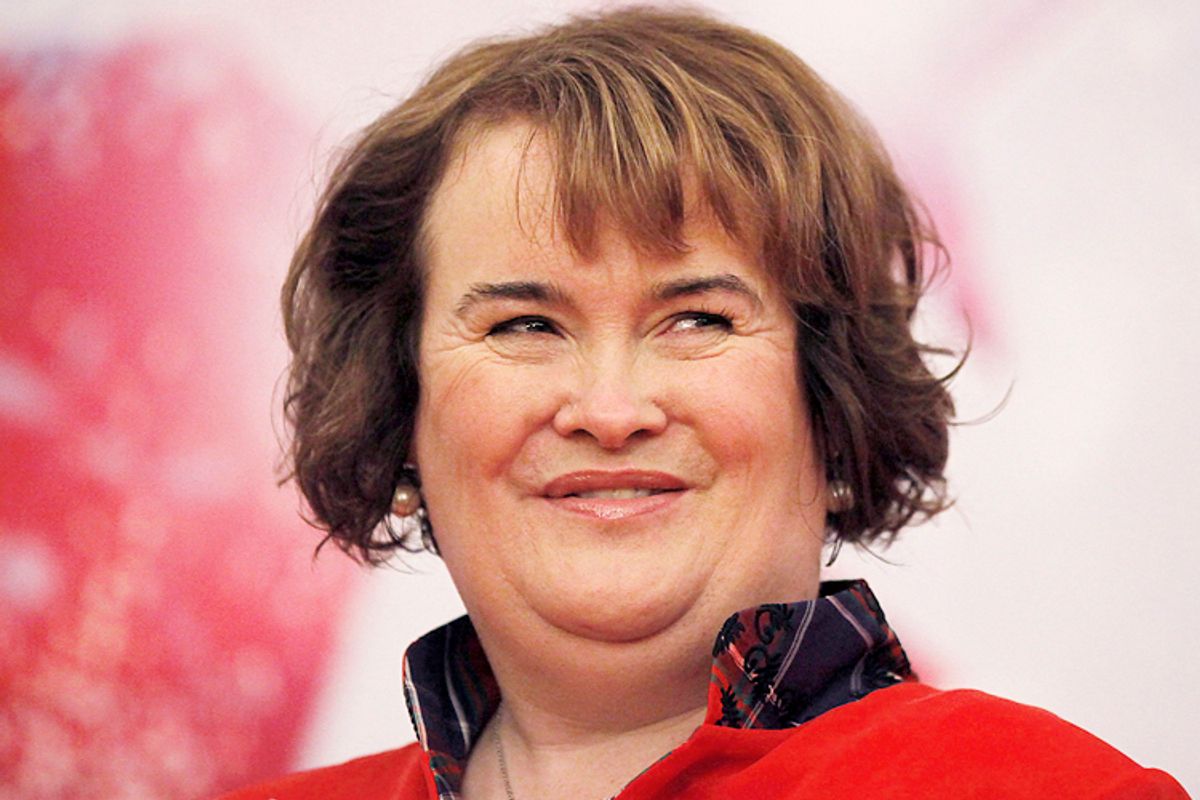Since Susan Boyle rose to prominence thanks to her legendary rendition of "I Dreamed a Dream" on "Britain's Got Talent" in 2009, she has made countless nasty headlines regarding her inability, initially, to metabolize fame. That is, until Boyle revealed last year that she had been diagnosed with Asperger's syndrome. And then last night was the premiere of the documentary "Susan Boyle: Her Secret Struggle," which aired in the U.S. on the Ovation network. Via email, Boyle explained to Salon why she is finally opening up about what it's been like for her to live in the limelight. "I don't think I will ever truly be comfortable with talking about something so intensely private and personal to me," she said, "but I felt it was important to share with people to help stem the negative comments and headlines that surrounded my quirky behavior." So years after her first TV appearance, she has gradually crept into another public role: the face of Asperger's syndrome.
"Her Secret Struggle" chronicles Boyle's discomfort with live singing and shows the behind-the-scenes mechanics of the support system she's built to help her head off potential crises and prepare for her current tour, her biggest one to date. "You need those people who understand you around you," she explained. "Also it's OK to be wary of new people and it's OK to ask people to respect your personal space." For a while, Boyle's behavior was a source of widespread media gossip, cited as evidence of a person nebulously unready for prime time. She could deliver a single song in a highly controlled reality-TV environment, but struggled in repeated talk-show appearan
In speaking publicly about her diagnosis, Boyle is bring to the forefront what had for so long been the subtext of her fame -- that there was always something standing between her and the ability to fully revel in the attention. "I felt if people understood and had a greater awareness then it would help stop the ignorance," said Boyle. Her perceived "weirdness" went from an easy punch line to a broader statement about life with Asperger's syndrome. Boyle was reluctant to extrapolate outwards about what her advocacy might possibly mean for anyone else -- indeed, she avoids, perhaps unsurprisingly, being described as famous at all. "I'm not sure I'd go so far as using 'icon' and my name in the same sentence but I am normal and I try to keep my feet on the ground and maintain normality," she said. "No one likes a person who gets too big for their boots or has an ego, and to be honest, with the wonderful people I have around me and my team, there's no way they'd let me become a diva." She even made her debut acting performance last year in "The Christmas Candle," after Rick Santorum's production company approached her about the film. (She met Santorum once, and describes him as "very professional.")
Speaking as someone who'd watched her botched "The View" appearance raptly, the news of her diagnosis, and her dignified advocacy for awareness in a culture that's more comfortable with slotting Asperger's syndrome as the subject of comedy, has put a human face on the syndrome in a way that few others have been able to do. That she'd struggled so publicly and so long only makes her case more real. "It's all about stemming ignorance and hopefully making people think twice about judging just because you don't conform to what society deems as 'normal,'" Boyle said. Here's hoping she takes a pass on the U.S. talk show circuit when her next album comes out -- not because she'd embarrass herself, but because her making dignified choices as to what works for her sends the strongest message of all. As for Boyle, she still lives in the same house she grew up in, in the same village, surrounded by lifelong friends and family , even as her life overall feels "beyond recognition." The documentary is "an honest portrayal," she said. "It's not been dramatized, it's my life living with Asperger’s syndrome." She's proud of the movie. "But to be honest," she added, "I can't bear watching myself on TV at all."



Shares